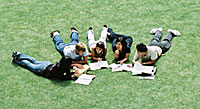 |
|
 |
| |
| |
| |
| |
| |
| |
| |
Campus: Kensington Campus
| |
| |
Career: Undergraduate
| |
| |
Units of Credit: 6
| |
| |
| |
| |
Contact Hours per Week: 3
| |
| |
Enrolment Requirements:
| |
| |
Prerequisite: 36 units of credit; Excluded: EURO2411
| |
| |
Equivalent: EURO2411, HIST2492
| |
| |
| |
| |
| |
 |
|
 |
Description
An overview of Spain's turbulent history following loss of empire, including the Spanish Civil War and the Franco Dictatorship. Most attention is given to the nation's transformation since 1975 (the death of Franco and the return to democracy) and its enthusiastic embrace of Europe. As a peripheral European nation, and one that has been riven by cultural, political and economic conflicts in the recent past, Spain may well constitute a litmus test for the viability of European unity.
Learning Outcomes
On completing this course, students should develop a solid understanding of:
- Spanish political, social and economic history since 1800
- The cultural and ethic diversity of the country
- The reasons for Spain's slow economic development and the resultant tensions that erupted in the Spanish Civil War
- The paradox of Spain as being, on the one hand, so apparently unique, yet, on the other, a mirror of wider political tensions in Europe
- The diverse political positions taken by Spaniards prior to the Civil War
- The contradicts of the Franco dictatorship, nationally and internationally
- The process by which Spain democratised and joined the European Union
- Spain's current position in Europe and the world
- Contemporary Spanish culture.
Students should also develop:
- A critical engagement with relevant disciplinary and interdisciplinary texts
- Critical thinking and the formulation of conceptual explanations
- Intellectual curiosity and problem solving
- An awareness of the interconnectedness of human activity, thought and knowledge
- Communication skills in reading, writing, speaking and listening
- Research skills so that conceptual arguments are supported by empirical and other evidence
- Information literacy - the ability to locate, evaluate, and use relevant information
- The ability to engage in independent and reflective learning
- The skills required for collaborative and multidisciplinary work
- An awareness of, and responsiveness to, change
- An appreciation of, and respect for, diversity
- What constitutes ethical practice and social responsibility
- A capacity to contribute to, and work within, the international community.
Assessment
- Role play (Spanish Civil War) - 40%
- Major essay (2000 words) - 40%
- Class participation - 20%
|

